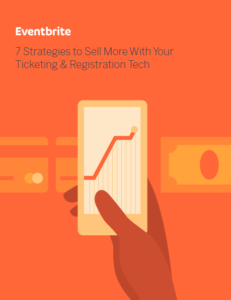Obsessed with ticket sales? You’re not alone. Ticket sales are the biggest source of revenue for 59 per cent of event professionals. Which means ticket pricing has a direct impact on the success and longevity of your event.
Pricing can be one of the more stressful parts of organising an event. A smart ticket pricing strategy is essential to driving a profit — but it’s not always easy to determine which approach is right. Here are six strategy tips worth considering when deciding how to price tickets.
Ticket Pricing Strategy Tip #1: Focus on value-based pricing
The most critical element of your pricing strategy is your customer. And while it sounds rudimentary, the most successful event directors include an important philosophy in their pricing strategy: charge attendees what the attendees are willing to pay. When using this pricing method, called valued-based pricing, these are the three elements to consider.
- Perceived value: Perceived value is what the customer thinks they will get out of your event – how much they think it’s worth.
- Per-ticket cost: The per-ticket cost to you for putting on the event. When totalling your costs for the food, venue, entertainment etc. what is the minimum amount that will cover costs?
- Actual Price: The actual price — which can be greater or less than the perceived value — is what the customer actually pays. Ideally, the actual price is below the perceived value so attendees feel they are getting a good deal.
For a complete guide on how to use value-based pricing for your event, download the ebook: How to Price Your Event with Value-Based Pricing
Ticket Pricing Strategy Tip #2: Lock in a core ticket price
It goes without saying that as an event organiser you want to sell as many tickets as possible. But it’s not always that simple. If you price too low, your profit margins could plummet. Price too high, and you risk hosting a near-empty event. One of the first steps you should take before implementing any pricing strategies is to lock in your “core” ticket price.
To secure a core ticket price that is “just right”, consider these three things:
-
What are your fixed and variable costs?
Event organisers work with both fixed and variable costs. To help shape your core ticket price you need to first take into account your fixed costs i.e. venue hire and entertainment. Once you have a hold on these you can work out the bare minimum your tickets need to be to cover costs.
Download this event budget template to determine your costs and stay on track.
-
What can history teach you?
Second, third, or fourth time running an event? Look at what history has to teach you. Did your most expensive tickets fly off of the shelves, or did they only sell once the cheap seats were gone? Did you hit your overall ticket goals, or did you create last-minute discounts to inspire more sales? Use this data to adjust your ticket pricing strategies — including VIP packages, discount codes and tiered options — accordingly.
Tip: Look at your “no show” numbers for past events. If your event has had historically low attendance compared to the number of tickets sold, you may want to consider selling over venue capacity to avoid ending up with an empty room.
-
What is your competition charging?
As Australia’s appetite for live events grows, so does competition for event organisers. In fact according to Eventbrite research 27% of organisers cite increased competition as their biggest concern for 2019. So when crafting your pricing strategy consider what other options cost and how this affects your events perceived value.
Check out your local listings to see what else is happening in your area around the time of your event and research past ticket prices for similar events. Put yourself in an event-goers shoes, and ask how your headliner, your venue, or your host city measure up to the competition. Pricing above the competition can feel risky, but if your event is a luxury alternative — or simply a better value — don’t be afraid to price accordingly.
Complete the exercises in this workbook to better understand your event’s value.
Ticket Pricing Strategy Tip #3. Increase perceived value through premium pricing
One way to influence your buyers is through a premium pricing strategy — pricing tickets intentionally high to increase the perceived value of your general admission tickets. This can be done most effectively by offering tiered VIP bundles.
According to our US research, a third of VIP attendees say the lack of a VIP package influences whether they’d attend an event. And 45% of VIP buyers are willing to spend 50% more than the cost of a regular priced registration to upgrade.
Offering limited VIP ticketing options attracts new attendees who may have bigger budgets and gives the buyer options. But more importantly, it also makes your general admission price look like a bargain in comparison to the premium offerings.
Read More: How to Inspire Live Music Fans to go VIP
Ticket Pricing Strategy Tip #4: Use discount pricing at key times
To get a jumpstart on your ticket sales, drive urgency as the event date approaches or when tickets sales have lulled, offer discounts. Discounts are an effective way to build buzz, create a sense of urgency, and reward attendee loyalty. Experiment with the following discount types.
- Early-bird discounts: Start with a lower price and gradually increase the price as the day of the event approaches. Tap into the FOMO (fear of missing out) when trying to market early bird pricing to price-sensitive attendees.
- Early entry discounts: Offer early entry to the event for a small fee. For example: 100 of your attendees could pay an additional $10 for early entry to your event. With minimal effort on your part, you enhance the experience for 100 of your attendees — and add extra profit to your bottom line
- Event day discounts: If your event management platform can show you past event attendance by time of day, you can take advantage of your busiest and slowest times. Offer limited-time-only discounts for those times of day when you could use a boost in attendance. For example, if your event was packed from 1-4pm, but nearly empty until then, give anyone who shows up before noon a discount.
Tip: Advertise discounts. Limited-time flash sales give prospective event-goers a reason to buy right away. Creating urgency around your event is a great way to boost perceived value and excite potential attendees.
Read More: 5 Ways to Maximise Ticket Sales with Multiple Ticket Types
Ticket Pricing Strategy Tip #5: Re-target prospective attendees
Retargeting ads target people who visited and left your event page without buying a ticket. Your event management platform should be able to show you your site visits relative to ticket sales — or in other words, your conversion rate. If your conversion rate is low retargeting can help.
When it comes to your pricing strategy, plan to retarget with discounts during slow periods, or schedule retargeting ads when you’ve nearly sold out of your first tier of tickets. Retargeting ads are most effective when they create a sense of urgency — which is why retargeting shortly before your event can work so well.
Tip: Are those retargeting ads working? If you aren’t sure, set up tracking links and/or tracking pixels for your marketing channels. This will tell you which channels generate the highest sales, so you can make sure every dollar is being used wisely.
Ticket Pricing Strategy Tip #6: Incentivise sales by ordering prices high to low
The placement of your prices affects the way buyers perceive price. For example, if you have multiple ticket types for your event — VIP, general admission, and early bird — listing the highest ticket price at the top of your page increases the probability that your attendees will buy a VIP ticket.
This works because attendees use the first and highest price as a reference point. That reference point affects their perceived value of the event. And, in turn, makes the general admission or early bird options look like a better deal.
From On-Sale to Sold Out: Marketing and Promotion for Events
Once you’ve set your ticket prices, it’s time to master on-sale. Download the free ebook, to get comprehensive strategy that engages your current attendees, reaches new ones, and turns interested event-goers into paid ticket holders and registrants.





